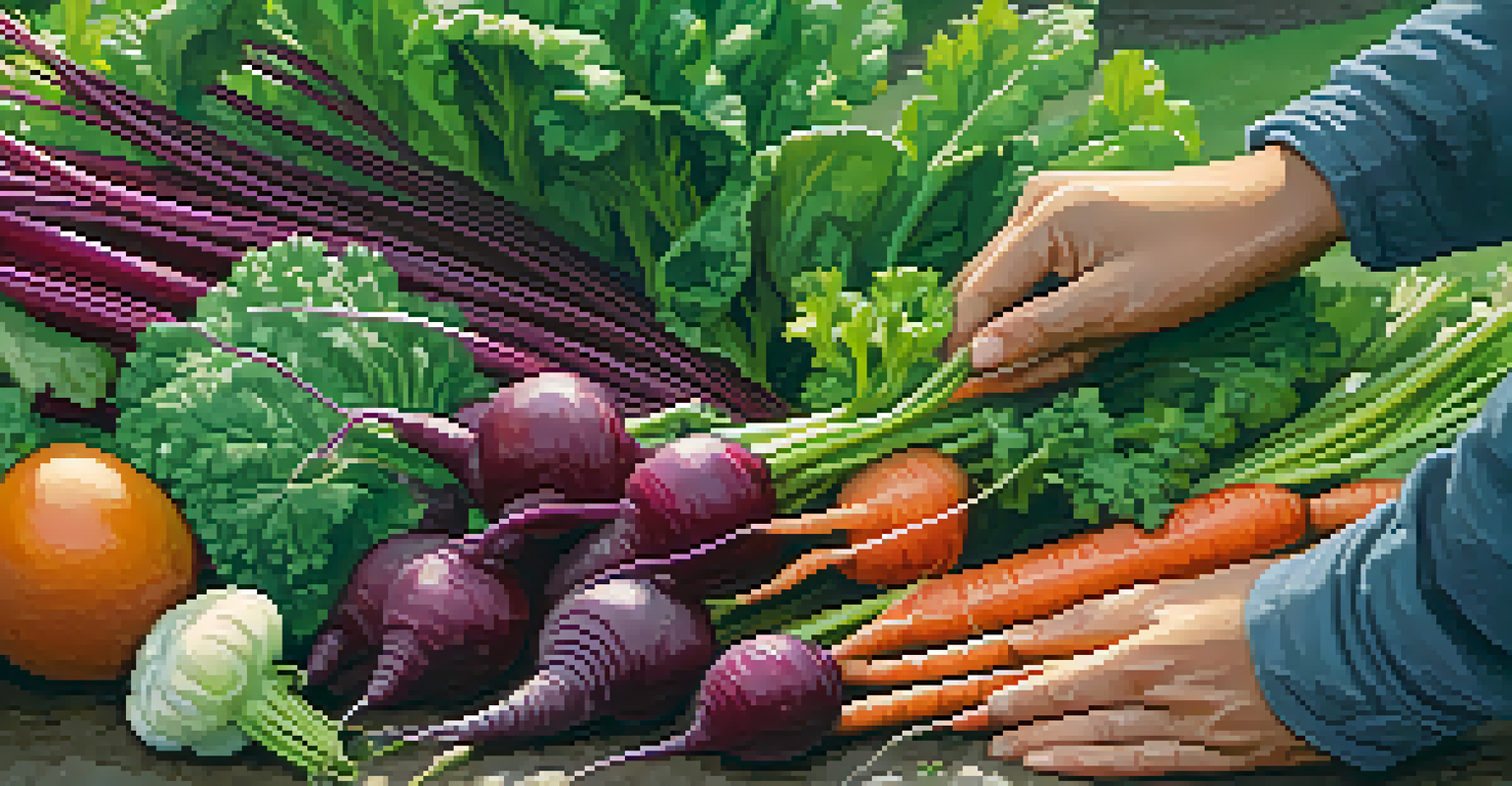Environmental Impact of Eating Seasonal Vegan Foods

Understanding Seasonal Eating and Its Benefits
Seasonal eating refers to consuming foods that are grown and harvested during their natural growing season. This practice not only supports local agriculture but also ensures that the food is fresher and more flavorful. By choosing seasonal vegan foods, you're opting for produce that hasn't traveled long distances, which significantly reduces its carbon footprint.
The future will be green, or not at all.
Imagine biting into a sun-ripened tomato in the summer versus a mealy one in winter; the difference in taste is remarkable. Eating seasonally connects us to the rhythm of nature, allowing us to enjoy the variety that each season has to offer. It's a reminder of the abundance that comes from our local ecosystems.
Moreover, seasonal eating often encourages a more diverse diet, as we are prompted to explore different fruits and vegetables that we might not typically choose. This variety not only benefits our health but also supports the local economy by promoting community farmers and reducing reliance on large-scale agricultural operations.
How Vegan Diets Reduce Environmental Impact
Adopting a vegan diet is one of the most effective ways to minimize your environmental impact. Animal agriculture is a leading cause of greenhouse gas emissions, deforestation, and water pollution. By choosing a vegan lifestyle, you're directly contributing to the reduction of these harmful practices, fostering a healthier planet.

For instance, studies show that producing plant-based foods generally requires less land and water than raising livestock. This means that each meal you prepare with vegan ingredients conserves valuable resources and helps preserve natural habitats. It's like choosing to walk instead of drive—every small step counts towards a larger goal.
Benefits of Seasonal Eating
Seasonal eating connects us to local agriculture, enhances food flavor, and promotes a diverse diet.
When you combine veganism with seasonal eating, the positive effects multiply. Not only are you forgoing animal products, but you're also selecting ingredients that are at their peak freshness, minimizing energy use in transportation and storage. This dual approach is a powerful way to contribute to sustainability.
Local Sourcing: A Key Component of Seasonal Eating
One of the biggest advantages of eating seasonal vegan foods is the opportunity to source ingredients locally. Local farms often offer produce that is fresher and more nutritious, as it is picked at its peak ripeness. By supporting these farms, you are also reducing the carbon emissions associated with long-distance transportation.
Eating seasonally is a way to reconnect with the land and the rhythm of nature.
Consider visiting your local farmers' market; it's a great way to connect with growers in your community. You can ask them about their farming practices and the seasonal crops they offer, fostering a deeper appreciation for your food. Plus, you'll likely discover unique varieties that you wouldn't find in a typical grocery store.
When you prioritize local sourcing, you're contributing to the local economy, creating jobs, and supporting sustainable farming practices. This ripple effect not only benefits the community but also promotes environmental stewardship, showing that our food choices have broader implications.
The Role of Biodiversity in Sustainable Eating
Biodiversity plays a crucial role in sustainable agriculture and eating practices. By consuming a wide range of seasonal vegan foods, you help promote the cultivation of diverse plant species, which is essential for ecosystem health. This diversity ensures resilience against pests, diseases, and changing climate conditions.
Think of it like a well-balanced diet for the planet; when we prioritize different crops, we support the soil, pollinators, and other wildlife. This interconnectedness highlights the importance of variety in our diets—not just for our health but for the health of our environment as well.
Vegan Diets Combat Climate Change
Adopting a vegan diet significantly reduces greenhouse gas emissions and resource use, fostering environmental sustainability.
By embracing seasonal vegan eating, you contribute to preserving rare and heirloom varieties that might otherwise be neglected. This conscious choice helps maintain a rich agricultural heritage and promotes sustainable practices that are vital for a thriving planet.
Minimizing Food Waste Through Seasonal Choices
Food waste is a significant environmental issue, contributing to landfill emissions and wasting resources used in food production. Eating seasonal vegan foods can help minimize waste, as these items are often fresher and have a longer shelf life. Additionally, purchasing foods in their peak season means you’re more likely to use them before they spoil.
When we choose seasonal produce, we naturally align our meals with what’s available, reducing the likelihood of overbuying or discarding items that go bad. For example, purchasing a bounty of zucchini in the summer can lead to creative dishes, from ratatouille to zucchini bread, ensuring nothing goes to waste.
Furthermore, many local farms offer 'ugly' or imperfect produce at a discount, which can be a fun and responsible way to shop. This practice not only saves you money but also addresses the stigma around food appearance, highlighting that taste and nutrition are what truly matter.
The Impact of Climate Change on Food Availability
Climate change is altering growing seasons and affecting food availability worldwide. By embracing seasonal vegan eating, we can better adapt to these changes while promoting sustainable practices that combat climate issues. Supporting local and seasonal foods can help mitigate the impact of climate change on agriculture.
As weather patterns shift, certain crops may become less viable in some areas, making it crucial for consumers to remain flexible and open to new seasonal offerings. This adaptability is not just beneficial for our plates but also for the farmers who rely on diverse crops to maintain their livelihoods.
Support Local Farms for Freshness
Sourcing ingredients locally not only ensures fresher produce but also strengthens the local economy and promotes sustainable practices.
By prioritizing seasonal foods, we send a message that we are committed to supporting resilient agricultural systems. This collective effort can lead to more sustainable practices that help combat the adverse effects of climate change, ensuring a healthier planet for future generations.
Making the Transition to Seasonal Vegan Eating
Transitioning to a seasonal vegan diet might seem daunting at first, but it can be an exciting journey of discovery. Start by researching what fruits and vegetables are in season in your area and plan your meals around these ingredients. This approach not only supports the environment but also introduces a delightful variety to your cooking.
Consider joining a community-supported agriculture (CSA) program, which connects you directly with local farms. Many CSAs offer seasonal boxes filled with fresh produce, providing you with the opportunity to try new foods and recipes while supporting sustainable practices. It's a win-win!

Finally, don’t hesitate to experiment in the kitchen. Seasonal eating encourages creativity, so embrace the challenge of incorporating what’s available into your meals. You'll find that this approach not only enhances your culinary skills but also deepens your appreciation for the food you eat and the environment it comes from.